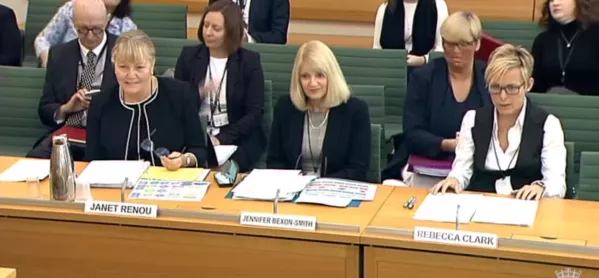MPs grilled three of the country’s eight regional schools commissioners this morning to find out just how their roles function in providing oversight of the academies system.
The Commons education select committee was taking evidence from Jenny Bexon-Smith, RSC for the East Midlands and the Humber, Rebecca Clark, RSC for the South-West of England, and Janet Renou, RSC for the North of England.
This is what we learned:
1. Health checks are coming
A pilot scheme of running health checks on multi-academy trusts is already underway, the RSCs said. The school commissioners’ group has been trialling a system of using a four-person panel to examine around 30 trusts to ascertain whether they are in a suitable position to expand. A full roll-out of the health checks will be introduced in 2017, but it is still unclear when exactly they will be brought in.
2. Rebrokering academies is a problem
The committee’s vice-chair, Labour MP Ian Mearns, was highly critical of the RSC’s performance when it came to finding new sponsors for underperforming academies. He pointed out that between 2010 and 2015, 70 per cent of academies found to be inadequate had not been rebrokered. Mr Mearns said the difficulty finding new trusts for academies highlighted an “inherent flaw” in the entire system. The Labour politician also told the RSCs that local authorities felt they could be not be anywhere near the rebrokering process for fear of derailing it.
3. No academy can be an island
Each of the RSCs felt that the multi-academy trust (MAT) structure provided the best opportunity to foster collaboration between schools. Ms Clark said that MATs could “hardwire collaboration”. And while they stressed it was still possible for standalone academy trusts to exist, Ms Bexon-Smith said those could not afford to be “isolationist”. “They have to make sure they are part of a wider collaboration,” she said. She suggested that standalone trusts could be merged, but if they resisted such efforts they would be expected to be part of a teaching alliance.
4. MATs ‘not growing too fast’
Ofsted chief inspector Sir Michael Wilshaw said recently that a number of academy chains had grown too big, too quickly. But today Ms Renou told MPs that far from allowing the academies programme to expand too quickly, she said they were “slowing it down”. They were more focused on “quality rather than quantity” when it came to converting schools, she added. Ms Bexon Smith admitted that a “minority” of trusts had grown too fast.
5. The ‘headteacher board’ is a misnomer
The headteacher panels that work to support the RSCs were criticised by Mr Mearns, who felt that the title given to them was misleading. The MP for Gateshead pointed out that serving headteachers were a minority on too many of the boards. He said that there were not enough participating headteachers from local maintained schools. But Ms Bexon-Smith countered that local authority heads do not have the experience of having converted to academy status.
Want to keep up with the latest education news and opinion? Follow TES on Twitter and like TES on Facebook




